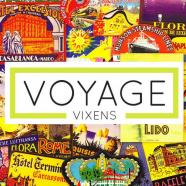Our introduction to Africa was inspiring and just a taste of what was to come. Here’s a recap of our first days in Nairobi, Kenya where we visited with artists, fashion designers, and craftsmen & women, spent time with orphaned elephants at the David Sheldrick Wildlife Trust, made out with giraffes at the Giraffe Centre in Karen, and enjoyed the luxury of Tribe Hotel Kenya. But it was the children at the Cura Orphanage who captured our hearts with their spirit and zest for life.
Links and more info on the places we visited and people we met in Nairobi follow below.
Nairobi, Kenya — Places to See, Things to Do, and People to Meet:
- The David Sheldrick Wildlife Trust: A Haven for Elephants and Rhinos
- African Fund for Endangered Wildlife – Giraffe Center
- Kuona Trust | Centre For Visual Arts In Kenya – Artists in Residence include: Fred Abuga, Cyrus Kabiru, and Paul Onditi
- Tribe Hotel Kenya & JIKO Restaurant
- Adèle Dejak | Jewelry and Handbags

- Anna Trzebinski – unique fashion hand made in Kenya
- Penny Winter: Fashion & Costume Designer
- Ngong House – Luxury boutique hotel in Nairobi
- Cura Orphanage: Children’s Home in Kenya
- Masai Market | Crafts Market, Nairobi *Note: The Market changes locations based on the day so check in advance to find out which location the market will be on the day you want to visit.
Shopping Tips for Masai Market
In the video, you’ll notice a heated but friendly bargaining interaction at the Masai Market in Nairobi between Sunny Dolat, brand ambassador at Tribe Hotel and a woman selling Khangas (colorful African fabrics with Swahili sayings). Haggling is standard and expected. If you really want to bargain like a local, you’ll throw in a ‘Aeeehhh, Mami!’ (as Dolat so elegantly demonstrates in video) when the initial price is quoted.

Although you’ll be tempted to stop at every vendor that calls out to you, don’t. Walk the entire market quickly. You’ll see a lot of the same thing over and over again. Take note of the things you like and take note of the difference in quality. Once you’ve taken a tour, then go back and haggle away. Also, bartering is accepted. You may want to bring U.S. brand t-shirts with you to trade. Lanee traded the headband she was wearing for a wooden spoon with a zebra striped handle.
Here are some items that you’ll want to buy because they will be less expensive than if you buy them in a gift shop elsewhere: beaded leather flip flops, Khangas, Kitenges (another type of African fabric with patterns typically worn by women as sarongs), wooden utensils/kitchenware/figurines, Maasai fabric (typically bright red/blue checked fabric worn by Maasai men) and beaded jewelry.
Nairobi’s Chic Hotel
If you like supporting local artisans, jetsetting Tribe Hotel is where to stay. The art gracing the public spaces and rooms at Tribe Hotel are by African artists. Another reason to choose Tribe as your hotel when in Nairobi is the warm hospitality each and every staff member exudes. From the valet attendant to the breakfast buffet omelet chef to the masseuses, genuine kindness and a zeal for service is exemplified.
And if safety is your concern when headed to Nairobi, Kenya, Tribe Hotel is located near the U.S. embassy. It’s peace of mind when you notice many guests at Tribe are either U.S. officials or military. So if it’s safe enough for them, it surely is safe for you.
Other perks we enjoyed while at Tribe were the world-class dining at JIKO by Italian chef Luca, facials at KAYA Spa, complimentary personal training at the on-site gym (even escorted outdoor jogs/walks), sharing a hookah at Nest (the hotel’s rooftop bar) and nighttime cocktail hour by the glittering pool.
With its high level of luxury and creature comforts, it’s an ideal stop over to rest and recoup from jet lag before heading out on safari. Nightly rates start at $300 for double occupancy.



 Subscribe to our email to get the latest news, travel tips, tricks of the trade, and our most recent posts delivered straight to your inbox monthly.
Subscribe to our email to get the latest news, travel tips, tricks of the trade, and our most recent posts delivered straight to your inbox monthly. 